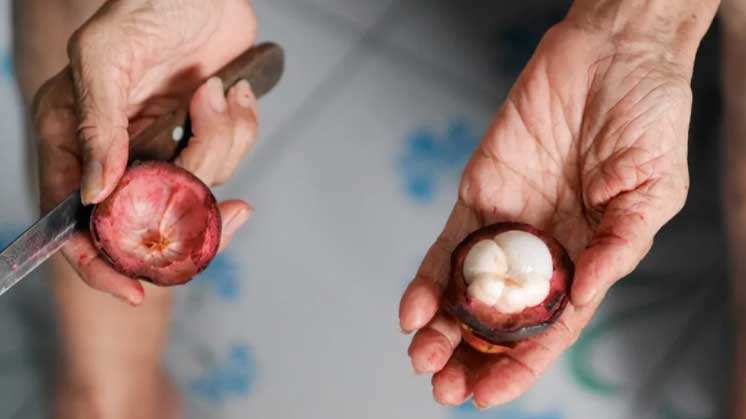SMART SEARCH
Everything you need to know about mangosteen













Everything you need to know about mangosteen
Mangosteen is a small purple fruit that grows in Southeast Asia. Mangosteen is a good source of nutrients. However, more research into the health benefits of mangosteen is necessary.
This article will outline what a mangosteen is, look at the science behind the health benefit claims, and explain how to eat mangosteen.

What Is A Mangosteen?
Mangosteen is a small, purple fruit from Southeast Asia. It has a hard outer skin and sweet, white, juicy flesh. People have described its taste as a mix of lychee, peach, strawberry, and pineapple.
Farmers tend to grow mangosteen in Indonesia, Malaysia, Sri Lanka, the Philippines, and Thailand. In these countries, people consume it as:
- fruit
- juice
- traditional medicine
Fresh mangosteen is hard to find in the United States for two reasons.
First, mangosteen trees need a fully tropical climate and lots of time to grow. Small farms in Hawaii and Puerto Rico, started in the 1990s, are only now starting to bear fruit.
Second, fresh mangosteen can harbor quarantine pests or non-U.S. native bugs that could threaten the ecosystem. It means mangosteen importers must sterilize the fruit before it enters the country. This sometimes affects the quality, taste, or shelf life.
Benefits Of Mangosteen
Mangosteen has many benefits. It contains a range of compounds and substances that are good for human health.
The benefits of mangosteen include:
Highly Nutritious
According to the U.S. Department of Agriculture, all fruits provide nutrients that are vital for good health.
One cup of drained, canned mangosteen contains:
- 143 kcal
- 35.1g of carbohydrate
- 3.53g of dietary fiber
- 23.5mg of calcium
- 94.1mg of potassium
- 5.68mg of vitamin C
Most fruits, including mangosteen, are low in fat, sodium, and calories, helping people maintain a moderate weight. They are also free from cholesterol, which can contribute to chronic conditions such as heart disease and type 2 diabetes.
Fruit is also a good source of nutrients that people in the U.S. often lack, such as:
- potassium, a mineral needed to help maintain healthy blood pressure
- dietary fiber, which helps people maintain a healthy gut
- vitamin C, which helps the body to heal cuts and wounds and to keep teeth and gums healthy
Contains Antioxidants
Antioxidants fight free radicals or harmful substances that can build up inside the body. Free radicals can contribute to health problems including:
- heart disease
- cataracts
- cancer
Studies have suggested that mangosteen contains antioxidants. One study from 2015 asked 30 people to drink a mangosteen-based beverage every day for 30 days. Researchers compared their blood to that of 30 people who had consumed a non-mangosteen-based drink or placebo.
At the end of the 30 days, the mangosteen group had 15% more antioxidants in their bloodstream than the placebo group.
Anti-inflammatory
Inflammation is a normal part of the immune system. It is the body’s way of removing foreign substances, like bacteria, viruses, or chemicals.
Sometimes, inflammation happens unnecessarily. Other times, it continues after the body has removed the threat. Doctors call this chronic inflammation. It can contribute to health problems including:
- cancer
- heart disease
- diabetes
- arthritis
- depression
- Alzheimer’s disease
In the 2015 study outlined above, scientists found that mangosteen may also act as an anti-inflammatory. They concluded this by measuring the C-reactive protein, a substance that signals inflammation levels. Over the 30 days of the study, levels of this protein in the mangosteen group reduced by an average of 46%.
Medicinal Properties
Some medicines include mangosteen as an ingredient, including:
- metratrim, a medicine that also contains Sphaeranthus indicus and may help people who have obesity or overweight lose weight
- a gel with 4% mangosteen can help with loose teeth and bleeding in people with serious gum disease, or periodontitis
- some moisturizers for oily skin
Potential Drawbacks
It is important to note that studies on the health benefits of mangosteen have been small so far. Scientists need more research before they can be sure.
The National Library of Medicine says that there is not enough evidence to say that mangosteen can help with:
- diarrhea
- dysentery
- eczema
- gonorrhea
- menstrual disorders
- thrush
- tuberculosis
- urinary tract infections
It also advises against using mangosteen medicines in the following situations:
- when pregnant or breastfeeding, as there is not enough evidence to say it is safe
- if the person has a bleeding disorder, as mangosteen may slow blood clotting
- for two weeks before surgery, as it may increase the risk of bleeding during or after an operation
Mangosteen and other herbal supplements may also interact with some medications, such as liraglutide (Saxenda).
How To Eat Mangosteen
People can peel the outer skin of the mangosteen and eat the wedges of fruit inside raw.
However, fresh mangosteen is hard to find in the U.S. Lots of mangosteen-based products, including supplements and juices, are available for people who would like to gain the health benefits of mangosteen but have difficulty finding fresh fruit.
Things to bear in mind with these products include the following:
- Some mangosteen juices contain only small amounts of fruit.
- Fruit juices do not contain the same dietary fiber as fresh fruits.
- Mangosteen may lose some of the substances that give it potential health benefits when manufacturers make the fruit into juices or supplements.
Summary
Mangosteen is a small purple fruit that grows in Southeast Asia. It is difficult to grow and import into the U.S.
Studies have suggested that the fruit has antioxidant and anti-inflammatory properties. However, there is not yet enough evidence to conclusively prove this.
Some medicines include mangosteen as an ingredient. These include drugs for obesity and gum disease. People who are pregnant, nursing, have a blood disorder, or are about to have an operation should avoid mangosteen-based medicines.
No thoughts on “Everything you need to know about mangosteen”
Who's On Line?
We have 69 guests and no members online
Articles - Most Read
- Home
- LIVER DIS-EASE AND GALL BLADDER DIS-EASE
- African Wholistics - Medicines, Machines and Ignorance
- African Wholistics -The Overlooked Revolution
- African Holistics - Seduced by Ignorance and Research
- Want to slash the risk of dementia by a third? Sort out your hearing!
- Advertising
- Steroids are life-saving for critically ill COVID-19 patients, WHO says
- Mark Hoppus has stage 4 lymphoma
- 45-year-old woman damages liver from drinking herbal brew - dangerous 'side effects' Story by Solen Le Net •
- Women's Sex Organ Related Dis-eases ( Herpes, V.D., Etc.)
- The health problem plaguing female Olympians as 'pee flies through air' during competition
- Four types of freshwater fish 'globally' associated with rhabdomyolysis - study warning
- Okra: Nutrition tips from experts
- Do Yams Have Carbohydrates?
- Quickly Drain You Lymph System Using Theses Simple Techniques to Boost Immunity and Remove Toxins
Articles - Latest
- 6 Things to Try When You Can’t Sleep
- The Male G Spot Is Real—and It's the Secret to an Unbelievable Orgasm
- Herbs for Parasitic Infections
- Vaginal Care - From Pubes to Lubes: 8 Ways to Keep Your Vagina Happy
- 5 Negative Side Effects Of Anal Sex
- Cartilage comfort - Natural Solutions
- Top 5 health benefits of quinoa
- Quickly Drain You Lymph System Using Theses Simple Techniques to Boost Immunity and Remove Toxins
- Do Yams Have Carbohydrates?
- 45-year-old woman damages liver from drinking herbal brew - dangerous 'side effects' Story by Solen Le Net •
- Four types of freshwater fish 'globally' associated with rhabdomyolysis - study warning
- Okra: Nutrition tips from experts
- Advertising
- The health problem plaguing female Olympians as 'pee flies through air' during competition
- Women's Sex Organ Related Dis-eases ( Herpes, V.D., Etc.)
- Mark Hoppus has stage 4 lymphoma
- Steroids are life-saving for critically ill COVID-19 patients, WHO says
- Want to slash the risk of dementia by a third? Sort out your hearing!
